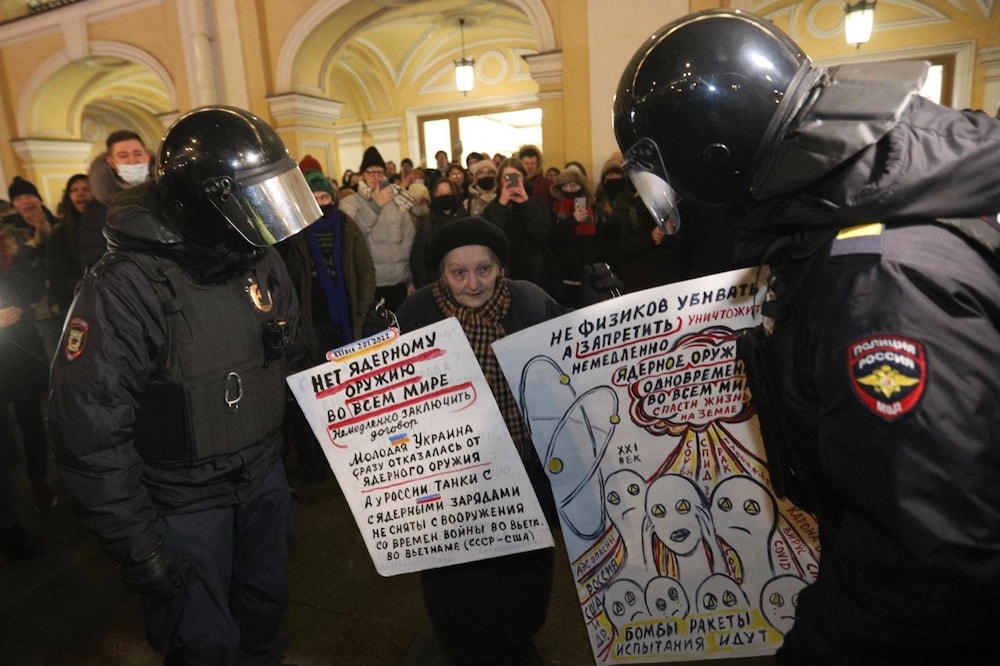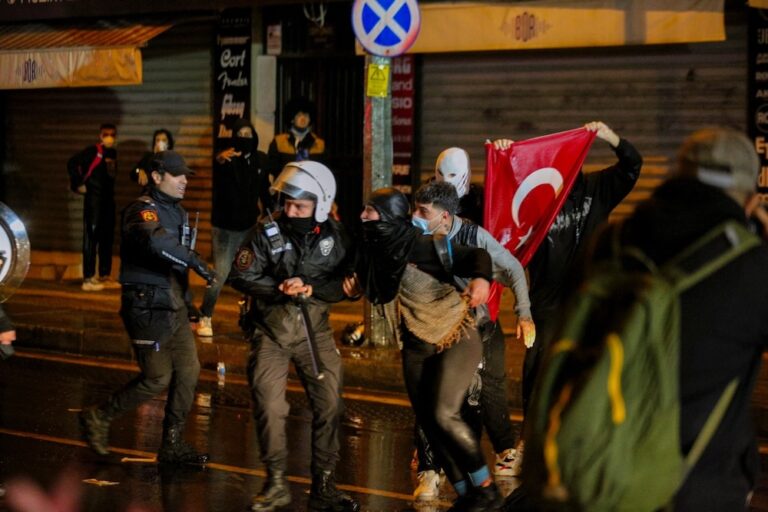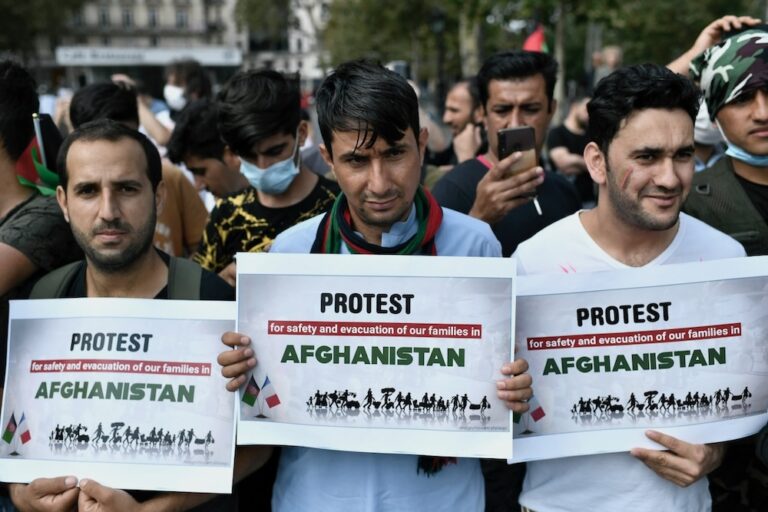March 2022 in Europe and Central Asia: A free expression round up produced by IFEX's Regional Editor Cathal Sheerin, based on IFEX member reports and news from the region.
Russia targets media in Ukraine and at home; IFEX member initiatives support Ukrainian journalists at risk; UN Belarus report reveals extent of government efforts to crush dissent; new Turkish bill threatens journalists with prison terms for critical reports on companies.
Targeting the media
Russia’s war of aggression against Ukraine has so far killed well over 1,000 civilians, forced 3.9 million people to flee abroad and displaced at least 6.5 million people inside the country’s borders.
It has also claimed the lives of at least six journalists and media workers. These are: Yevhen Sakun, who died in a Russian rocket attack on 1 March; Viktor Dedov, who was killed by a Russian bomb on 11 March; Brent Renaud, who was shot by Russian troops at a roadblock on 13 March; Pierre Zakrzewski and Oleksandra Kuvshynova, who were killed by Russian artillery on 14 March; and Oksana Baulina, who was killed by Russian shelling on 23 March. At least another seven have been injured; several more have come under fire.
At least six journalists have been taken hostage by Russian troops; some have been released and have spoken of the shocking torture they endured whilst detained. One journalist – Maksym Levin – has disappeared.
It is very clear that the Russian forces have been targeting the media in Ukraine – just as they have been targeting civilian areas with their shells. IFEX’s regional member, the Institute for Mass Information (IMI), recorded 148 attacks on the media in the first month of the invasion (23 February to 23 March). As well as killings, these attacks include the bombing of TV broadcast towers and cyber attacks on media.
“Total information blackout”
While President Putin’s regime has been killing civilians and journalists in Ukraine, its offensive against the press and civil society at home has intensified dramatically.
In early March, Putin signed a new law that criminalises the dissemination of ‘false information’ about Russia’s army: journalists who use non-Kremlin-approved language to describe Russia’s actions in Ukraine (for example, by referring to an ‘invasion’ or ‘war’ rather than to a ‘special military operation’) could now face up to 15 years in prison. Several international press outlets left Russia after the new law was signed, as did at least 150 Russian journalists. UN experts said that the new legislation imposes a “total information blackout on the war and in so doing gives an official seal of approval to disinformation and misinformation”.
Consolidating this “information blackout”, a large swathe of foreign and domestic media has also been censored or banned, as have Facebook, Twitter and Instagram.
In late March, the renowned newspaper Novaya Gazeta announced that it would cease publishing entirely until the end of the war. This followed a warning from the state media regulator that the newspaper had allegedly violated Russia’s ‘foreign agent’ law. The day before the warning was given, Novaya Gazeta’s Nobel Prize-winning editor, Dmitry Muratov, had interviewed Ukrainian president, Volodymyr Zelenskiy, in a group interview that was quickly banned in Russia.
State TV continues to toe the Kremlin line on the war by pumping out disinformation to viewers. However, March saw several journalists and presenters resign from state media outlets, apparently in protest at the war. The most high-profile protest/resignation was that of Marina Ovsyannikova, who interrupted the Channel One evening news on 14 March by invading the set and holding up a sign that read: “No to war. Don’t believe the propaganda. They are lying to you. Russians against war”. Ovsyannikova was arrested and charged with “discrediting” the armed forces; if she is charged with spreading ‘false information’ about the army she could face a long prison sentence.
Russian anti-war protests continued into March. These have seen at least 15,000 demonstrators arrested, several of whom have been subjected to torture or ill-treatment.
IFEX members respond
The response from IFEX members both inside and outside of Ukraine has been hugely impressive. Several members have launched initiatives to support Ukrainian journalists and defend the right to free expression and access to information:
- Reporters Without Borders, IMI and Free Press Unlimited set up a Free Press Centre in Lviv to provide journalists with protective equipment and psychological support;
- The European Federation of Journalists (EFJ) and partners worked with the Kosovo Government to provide safe refuge to 20 fleeing media workers;
- Free Press Unlimited launched Media Lifeline Ukraine to provide local media with equipment and security resources; it has already assisted 200 journalists to relocate to safer areas;
- The Independent Journalism Center is providing assistance to exiled Ukrainian journalists; it also organised a workshop for journalists working in conflict zones;
- The International Press Institute (IPI) is helping European news rooms to host exiled Ukrainian journalists and has launched a press freedom tracker to record attacks on the press in Ukraine and Russia during the conflict;
- PEN America published a guide to tackling Russian disinformation;
- Numerous IFEX members – including IMI, EFJ and the International Federation of Journalists, IPI, and the South East European Network for Professionalization of Media (SEENPM) – have launched fundraisers to support Ukrainian journalists;
- ARTICLE 19 called on the UN Human Rights Council (at the Urgent Debate on Ukraine at the 49th Session of the UN Human Rights Council) to establish a Special Rapporteur on the human rights situation in the Russian Federation, and on Member States to suspend Russia’s membership of the Council.
International inquiries
International pressure on Russia ramped up sharply in March. By the end of the month, Russia had been expelled from the Council of Europe; the UN Human Rights Council had voted to establish an independent international commission of inquiry to investigate Russia’s invasion of Ukraine; 45 OSCE states had invoked the Moscow Mechanism to examine human rights violations arising from the invasion; 38 states had asked the International Criminal Court (ICC) to open an investigation into Russia’s war crimes; and the international community had imposed several rounds of sanctions on Russia and individuals connected to Putin’s regime.
“Crush dissent and repress civil society”
At the 49th session of the UN Human Rights Council, a report on Belarus by the Office of the United Nations High Commissioner for Human Rights (OHCHR) laid bare the violations of rights that have taken place since the disputed presidential election of August 2020. Covering August 2020 to December 2021, the report includes several shocking statistics demonstrating the extent of the authorities’ efforts to – in the words of the OHCHR – “crush dissent and repress civil society”.
According to the OHCHR’s findings: more than 37,000 protesters were detained between May 2020 and May 2021; there are currently over 1,000 political prisoners; at least 270 NGOs had been shut down by October 2021; 36 lawyers who defended critics of the government had lost their licences by November 2021; and by the end of 2021, 32 journalists were behind bars, with 13 press outlets declared “extremist”.
March saw further dubious convictions of independent journalists and media workers, including Nasha Niva’s Yahor Martsinovich and Andrei Skurko (both sentenced to 2.5 years in prison), and former RFE/RL journalist Aleh Hruzdzilovich, who received a 1.5 year prison sentence.
The closed trial of Sofia Sapega began on 28 March. Sapega, who was arrested in May 2021 after the Belarusian authorities forced the plane that was carrying her (and her partner Raman Pratasevich) to land in Minsk, is charged with “inciting social hatred” and “violence or threats” against the police. The charges stem from her alleged role as administrator of a Telegram channel that published the personal data of security forces. She faces up to six years in prison if convicted.
Critically reporting on businesses could lead to prison
Turkey’s crackdown on independent voices shows no sign of relenting.
March saw developments in some high-profile cases of particular interest to IFEX members: four former Taraf journalists on trial for exposing state secrets were sentenced to 26 years in prison; journalist Sedef Kabaş was sentenced to two years and four months in prison on charges of “insulting the president” (she was released on account of time already served); and in the case of unjustly detained civil society leader Osman Kavala, the prosecutor asked for an aggravated life sentence for “attempting to overthrow the government” (a verdict is expected on 22 April 2022).
In late March, the ruling Justice and Development Party (AKP) introduced a new bill to parliament that, if passed, will criminalise journalists for critical reports on businesses. Reporters who “deliberately… damage the reputation, trust and wealth of the company through the media” could face fines and up to three years in prison.
Women journalists and activists often find themselves targeted in Turkey. The Coalition for Women in Journalism’s latest report on women and press freedom reveals that Turkey led the way on legal harassment, defamation and detention of women journalists in February 2022.
However, there was also some positive news for women in Turkey this month: thirty-three women activists, who were charged with violating public meeting laws when they protested Turkey’s 2021 withdrawal from the İstanbul Convention on violence against women, were acquitted.
In brief
The UK Supreme Court refused to consider Julian Assange’s appeal in the US extradition case against him. The case will now be sent back to the Home Office for a decision to approve or reject extradition.
The Case Coalition and ARTICLE 19 published in-depth reports on the challenges to free expression and democracy posed by Strategic Lawsuits Against Public Participation (SLAPPs) across the EU.
Ahead of April’s parliamentary elections in Hungary, IPI published a report detailing how the Fidesz government is eroding press freedom.



